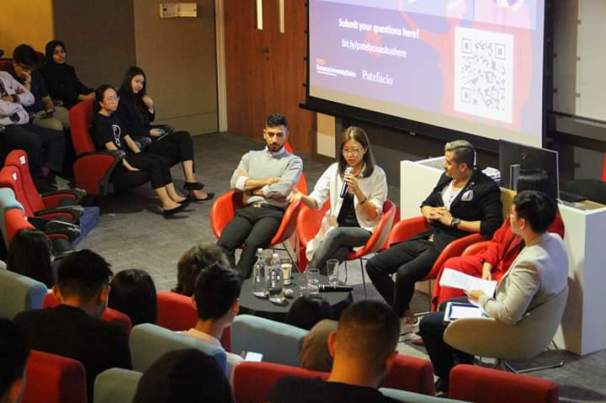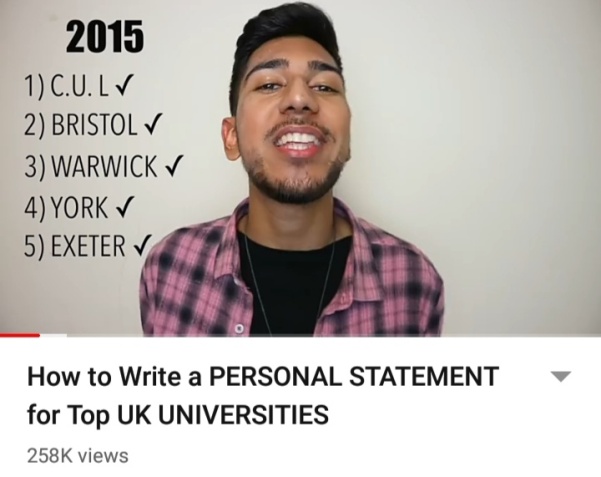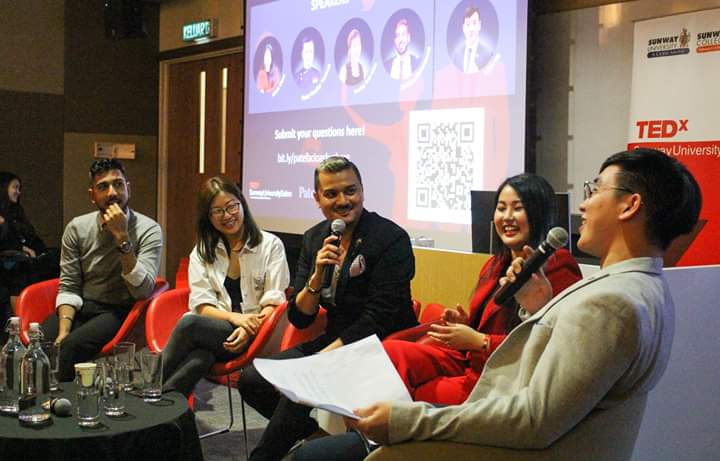
Patefacio
TedXSunwayUniversitySalon
Reported by Fajar
Edited by Supriya Sivabalan
On Thursday the 12th of September, a forum regarding the significance of social media in entrepreneurship and personal branding took place in GC Hall 3. The forum was organised by TedXSunwayUniversity with the intriguing Latin title ‘Patefacio’ which means ‘to disclose’ or ‘bring to light’. The panellists included a variety of characters with very different backgrounds and experiences, but all who are entrepreneurs capitalizing on social media presence in their own way.

At 7pm, the event started and the moderator, Mike Ng (who has an extremely impressive resume himself) introduced us to the first panellist, Adele Chow, with an invitation for her to explain her journey to entrepreneurship. She spoke with easy confidence, recalling how she tried getting involved in business from the age of 18. At the time, social media was not the big marketing platform that it is now, but she had a blog where she would do paid reviews of products and from there, noticed a gap in the market where someone was needed to connect interested consumers to the products. By the age of 25 she had founded 3 different businesses: Seven Pie, Seven Vault, and Build Beings.
The next panellist, Dato’ Fazley Yaakob was asked how he ended up as a contestant in Masterchef Malaysia and his journey from winner to restaurant owner. My fellow accounting students out there, rejoice, Dato’ Fazley himself is actually a BAF graduate! He was working as an auditor for a while before realising it wasn’t for him. He then branched out into singing, motivational speaking as well as working behind the scenes on reality TV to evoke emotional responses from contestants – which is what he thought he’d be doing when he signed a contract to be on Masterchef Malaysia. It is only when his wife rechecked his contract that he realised he was actually a contestant. 50 challenges later, he won and was offered to join LeCordon Bleu in Sunway where he was consistently top of his class. After graduating he opened SukaSucré Bistro, continued to put out music and to this day lectures for LeCordon Bleu around the world!
Third was Fuh Yu Wen. For a year and a half after graduation, she was an investment banker, working a simple 9-5 wherein she connected stock buyers to brokers. Unhappy in the stagnant environment, she tried her hand at acting before working for the government initiative Cradle that provides advice to startups. While working, she found that the learning process went both ways as she taught entrepreneurs how to raise finances and they taught her about technology and business, which is how she gained the experience and confidence to start SushiVid, a platform that helps brands to find, hire and work with influencers for marketing campaigns.
Last but not least was Ibrahim Mohammed, the only non-Malaysian on the panel. With his distinguishable British accent, he talked about his poverty-stricken upbringing. As one of 7 siblings of an immigrant mother, living in a very deprived area of London, he grew up not understanding the importance of education, and did poorly in his GCSEs. However, his life turned around once he moved out and started working two jobs while also studying excessively for his A-Levels, earning marks in the top 1% of the city. He was accepted into Cambridge.
Citing Jenna Marbles as one of his inspirations, he started making educational Youtube videos under the channel Ibz Mo to help educate people on how to study, what to bring to exams and the like. He just wanted to help others who were in a similar position that he had been in. He has worked as vice president in Cambridge to make it more accessible to different communities and recently started up “Building Today’s Young Students” (BTYS Ltd)”, as a more structured way to help disadvantaged students pursue higher education.

The introductions alone were enough to teach the audience a thing or two about grit, persistence and hard work. It also served to establish the authority each panellist had on the subject matter.

The first question was “how do you deal with haters?”. Dato’ Fazley took point, explaining how he had come up with a new concept for serving desserts which is to sort of throw them all over the table with music playing as a performance. ‘Haters’ or to put it kindly, ‘sceptics’ questioned this method very vocally online which is what actually helped popularize his method, earning him invitations from around the world to perform. His critics are the ones who gave him a louder presence. He also ascertained that haters hate you because they care. Adele Chow echoed this sentiment with the quote “don’t be sad they don’t like you – they don’t like themselves either”.

Next was the question
“Should you distinguish between business and personal branding while using social media, why and how?”.
Each panellist had a very different take on this. Fuh Yu Wen was of the opinion that there should be no separation as she ‘has no budget’ for that (timewise as well as money). “Everything that is me is the business”. She has combined her lifestyle, opinions and image indistinguishable from her business as investors want to see that a business owner is more invested in the business success rather than personal image.
Adele Chow disagreed to some extent as she believes that an entrepreneur must be mindful of the line between personal opinions and the business image. Ibrahim Mohammed backed up this opinion. He explained that as a Youtuber, he needed to harness his natural personality and energy when making videos because that is what’s attractive to viewers. However, he still needed to be mindful of not letting jokes or opinions that may only work in a personal setting from slipping into his online or professional setting ‘persona’.
Dato Fazley had the most comprehensive answer. As a man in his 40s he has lived in a time where he sold his own cassettes to make money. He has seen the rise and fall of countless social media platforms. Facebook became a site for ‘dinasours’ so he was directed to Instagram then Twitter then Tik Tok. Through all these jumps or expansions between platforms, he has always kept some part of his personality just for himself. Despite having to put on a different persona for each site, when he goes home to his family at the end of the day, he shucks it all off and remains consistent to his ‘clownish’ personality.
“Instagram has a new initiative wherein they hide the number of likes on certain people’s pictures so that users will focus more on the content and less on the popularity. What do you think of this?”
Adele Chow started by talking about how people get a certain dopamine release when they see their likes, especially when compared to other ‘lesser’ posts. And because of this, Instagram’s initiative is good in the sense that it may reduce addiction and stress relating to online posting. However, from a business perspective there may be some issue but she won’t say if it’s good or bad. Companies may no longer be able to choose an influencer based on followers and likes, rather they will look to audience and image.
Fuh Yu Wen added that these days, advertising is moving more towards performance results. Likes and comments don’t bring in money – sales do. So that’s what companies look for in their influencers – how many ‘buys’ can they generate?
Coming from a different perspective, Ibrahim Mohammed pointed out that social media is no longer the future, it’s now. Cambridge University spent a lot on marketing but of course, their open days and pamphlets are less accessible to poorer communities. What’s great about social media is that it’s free, everyone has an Instagram account and everyone can receive that marketing to see how the buildings in Cambridge look, how is the experience, what scholarships are available to them. Likes don’t matter in that regard, content does .
“In the face of marketing hoaxes, what can brands do to inspire trust?”
A simple rhetorical question was thrown back to the audience by Adele, “how do YOU know you trust someone?”. She went on to explain that it is through shared stories and experiences that a company can humanize themselves in the eyes of the consumers and be trustworthy.
As a brand ambassador for over 25 brands, Dato’ Fazley talked about how his face and seal of approval is stamped all over these products, from ice cream to soy sauce to pans. The reason his approval is so valuable is because he only grants it to brands that he truly has good experiences with. As a brand ambassador, his responsibility is not to the brand but to consumers.
The final question was then asked. “Do you have any advice for us?”
Ibrahim kicked off with his advice towards students. “Do your reading list, wake up early, Kim K wakes up at 6am everyday! She’s my role model”. He continued with advice to build up your CV through involvement in societies as networking is the most important thing after graduating. You want to graduate with more than just a degree.
To youtubers, his advice is that you won’t get a million views from the first video. Making videos includes a whole lot of annoying details; filming, editing, cutting (we here in Echo can relate!). Once you do gain a following you’ll be talked about, not always in nice ways. Be tough, stick to it and you’ll get there. And finally, to entrepreneurs he encourages you to do research and listen to what people have to say. Learn from the criticisms.
Fuh Yu Wen’s advice made the audience smile in surprise. “Don’t listen to your parents”. In her context, her parents discouraged her from business as they knew it was hard endless work and wished for her to have a nice 9 to 5 instead. However, entrepreneurship was in her blood and she thinks no one should run from who they want to be. “People take years and years to get anywhere. You have to grind. Knowledge is everything. Take your time, find your journey, figure out your gift and passion”. She also told us that a lot of effort goes into every success that we may take for granted. In her opinion there is no such thing as a balanced life and more substance will create more impact.
Dato’ Fazley recounted how when he was studying for his degree in New Zealand, he worked part time as a toilet cleaner, leading him to question his life choices. However, his degree was important even if it has little to do with his work now. When he returned to Malaysia and put out his first hit song, his boss, the CEO of Warner Music at that time (Tony Fernandes!) told him to not just stick to music but to branch out into everything he can. “Many doors will open after you finish your degree” and “it’s not about the awards you earn, it’s about the experience you gain along the way”.
Adele wrapped things up with the advice to know why you want to do what you want to do. What is the reason? Passion? Parents? Glamour? The end goal of being rich? Entrepreneurship is not a goal, it’s a process.
And with that, the forum was over. The emcee requested Dato’ Fazley give a little performance to which he obliged with a Cantonese song about friendship. The emcee then memorably performed a verse out of an Ed Sheeran song at the request of Dr Fazley, photos were taken, tokens of appreciation given, and then everyone dispersed. It was a highly educational event, memorable, fun and definitely worth the RM5 price tag. Kudos to yet another great event put out by TedxSunwayUniversity!



